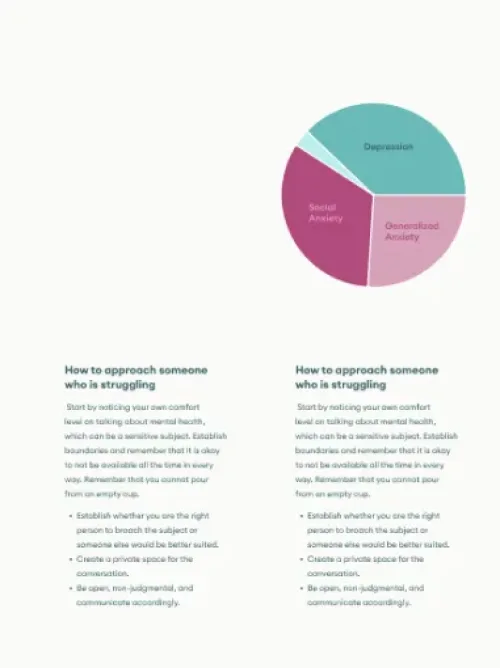Answers to Common Questions About Sleep: Part Two

5 Minute Read
Questions About Specific Sleep Challenges
By Dr. Kayleigh-Ann Clegg, Clinical Psychologist and Clinical Content Specialist at CloudMD
Welcome back to our two-part series on answers to common questions about sleep. I compiled this guide based on some of the excellent questions I received following our recent “Ask an Expert” client webinar on this topic.
Click here to check out part one where I talked about improving sleep. Otherwise, let’s dive into part two – addressing specific sleep challenges!
Any suggestions for dealing with night sweats?
Night sweats can happen for a lot of reasons, including environmental conditions, hormone fluctuations, underlying physical conditions or mental health concerns, or as a side effect of certain treatments or medications. If you’ve adjusted your sleep environment (e.g., reducing the room temperature or using a fan or breathable fabrics) and your sleep habits (e.g., showering before bed and reducing things like caffeine and alcohol), consider consulting with a physician.
How do I get more comfortable using my CPAP machine?
Many people experience difficulties getting used to continuous positive airway pressure (CPAP) machines (these help treat sleep apnea); it can take some time and troubleshooting to get comfortable with them. Be patient with yourself, go slow, stick with it consistently, and use all the resources available to you. It’s common to have to try a few different mask shapes and sizes or to have to adjust the pressure range of your machine. If you continue to experience ongoing difficulties, consider consulting with a physician or CPAP specialist about additional resources and treatments or to request a follow-up sleep study.
How do I manage my own sleep deprivation as an exhausted parent?
Sleep challenges are common as a parent. If you have a newborn or young baby, the most common counsel is to try to sleep when your baby does and enlist as much support and help as you can get. If your kids are a little older and you’re all having difficulties with sleep, consider building consistent mealtime and bedtime routines (and getting your kids involved in choosing what you put in those routines), slowly increasing your kids’ independence around falling asleep and waking up on their own, and enlisting as much support and help as you can get from a partner, friends, family, or professional resources like a physician or therapist.
How can I deal with frequent bathroom breaks at night?
More frequent bathroom breaks at night are common in certain circumstances, such as pregnancy or changes to your circadian rhythm as you age. However, frequent bathroom breaks (called nocturia), especially if you’re getting up two or more times in a night, can be a symptom of underlying health issues or sleep disorders, like sleep apnea. The first step would be consulting with a physician to confirm that nothing else is going on. If all is well, the next step would be to think about how much liquid you’re drinking close to bedtime, as well as when your last caffeinated or alcoholic beverage of the day is, and tweak those to see if that makes a difference. Finally, for getting back to sleep after a bathroom break, focus on keeping everything as dark as possible, keeping bathroom breaks short, and getting right back to bed without any diversions.
How can I control racing thoughts at night?
If your brain seems to switch into overdrive the moment your head hits the pillow, consider building that time into your sleep routine before you get into bed. For example, set a five-minute timer and sit down in low light, in a specific “worry” chair, and write out all your thoughts and worries. When the time’s up, go about the rest of your routine – maybe shower, do a few minutes of gentle stretching or breathing, then get into bed. If your brain switches on again and doesn’t settle down within 20 minutes, get up again and go back to the worry chair and write down whatever else has popped up. It may take a little while of repeating this for your body and mind to get the memo, but eventually, you will break the association your system has made between your bed and “worry” mode.
What can I do to stop waking up so often in the middle of the night?
Nighttime wakings are very common – we actually have many each night and aren’t aware of most of them – and they tend to get more common as you age. They’re also more common when you’re experiencing more stress or when there are underlying physical or mental health concerns. Consider tweaking your wind-down routine, keeping consistent sleep and wake times, getting some exercise during the day, using things like breathing exercises and strategies to manage stress, and reducing the presence of sleep disruptors like caffeine and alcohol. Too much wakeful time in bed can weaken the association between “bed” and “sleep”. So, if you do wake up in the night and aren’t able to fall right back to sleep, get out of bed (keeping the lights off or very low) and do something low energy, like listening to a podcast (preferably a quiet or dull episode), reading (something that isn’t too stimulating), gentle stretching, or breathing exercises; then get back into bed and try .
If you or someone you know is struggling with sleep or dealing with the effects of insomnia, help is always available. Going through your family doctor for an appropriate referral or checking out what’s offered through your EAP are both good places to start. CloudMD offers a variety of health and wellness programs, including Employee Assistance, Mental Health Supports, and Telemedicine with a highly skilled nurse to help employees navigate the process. Connect with us to bring this innovative program to your organization.




